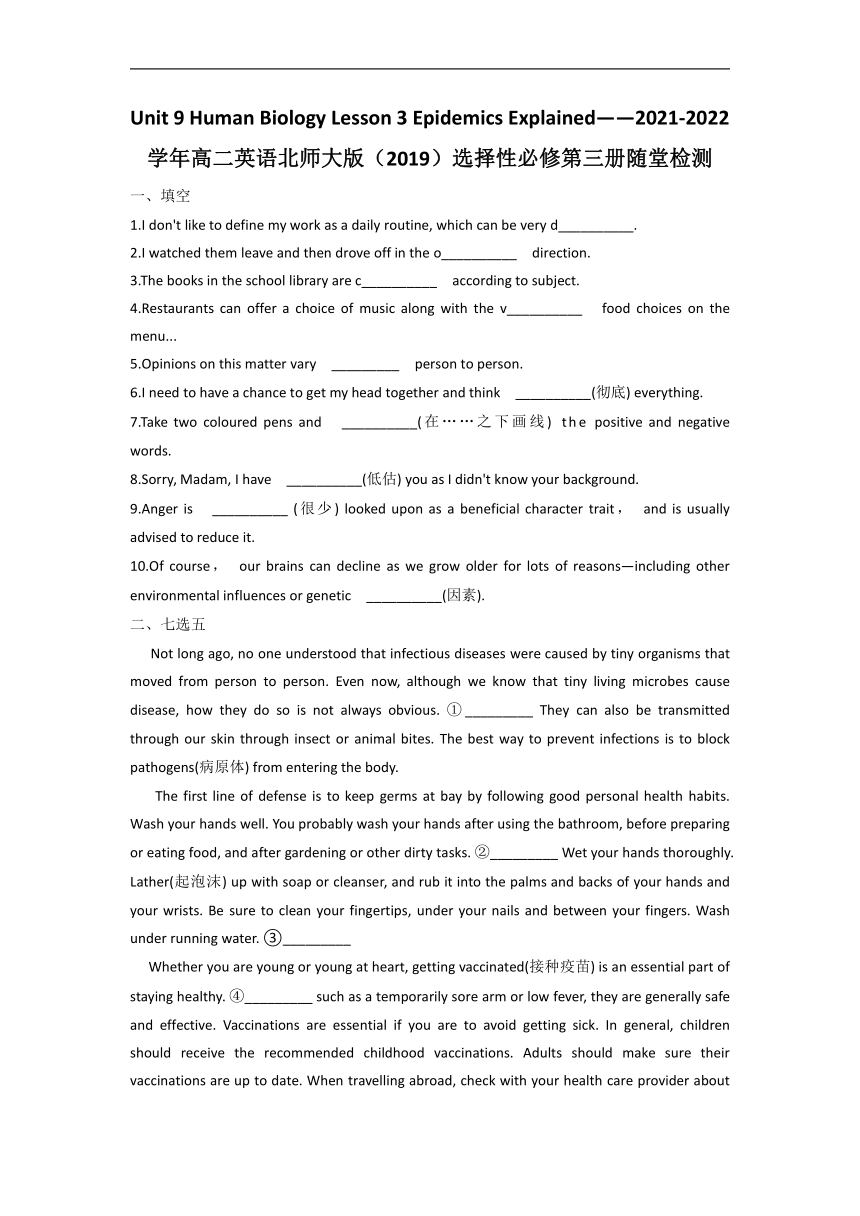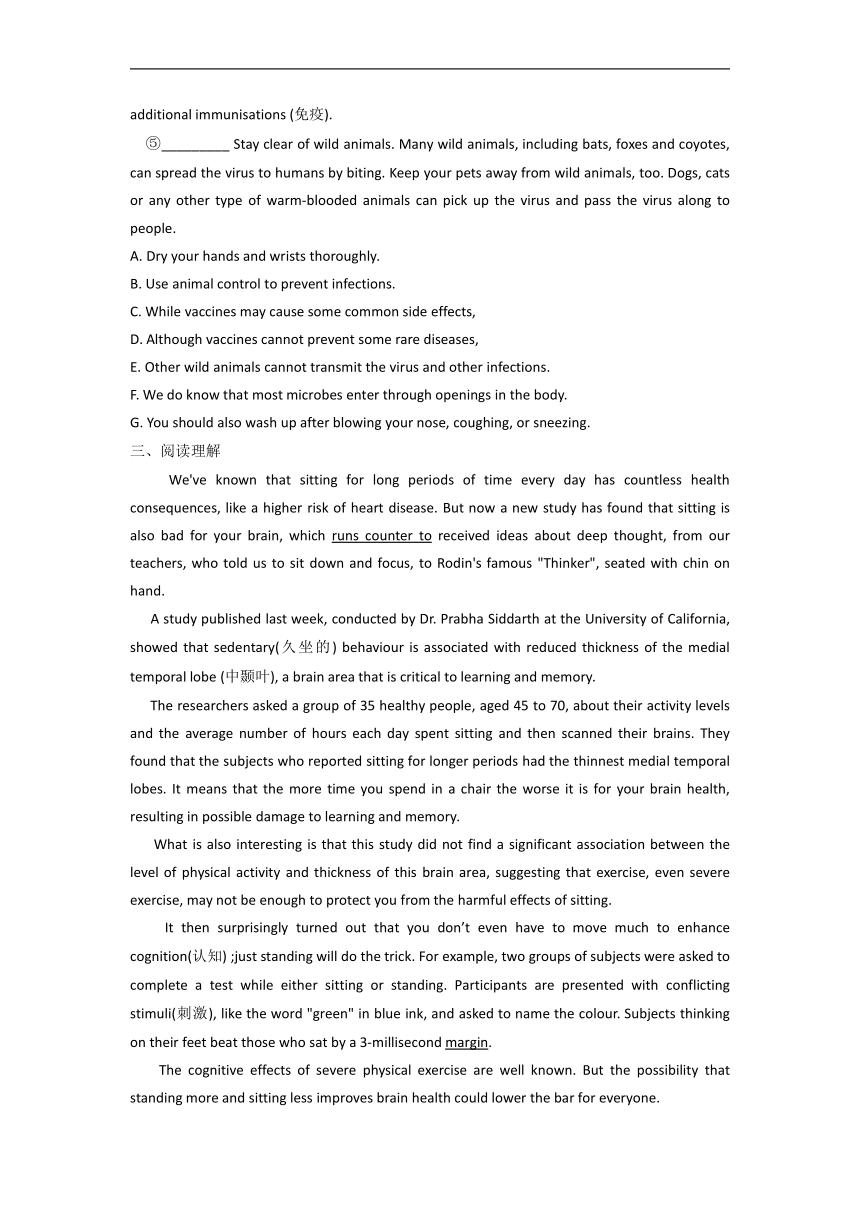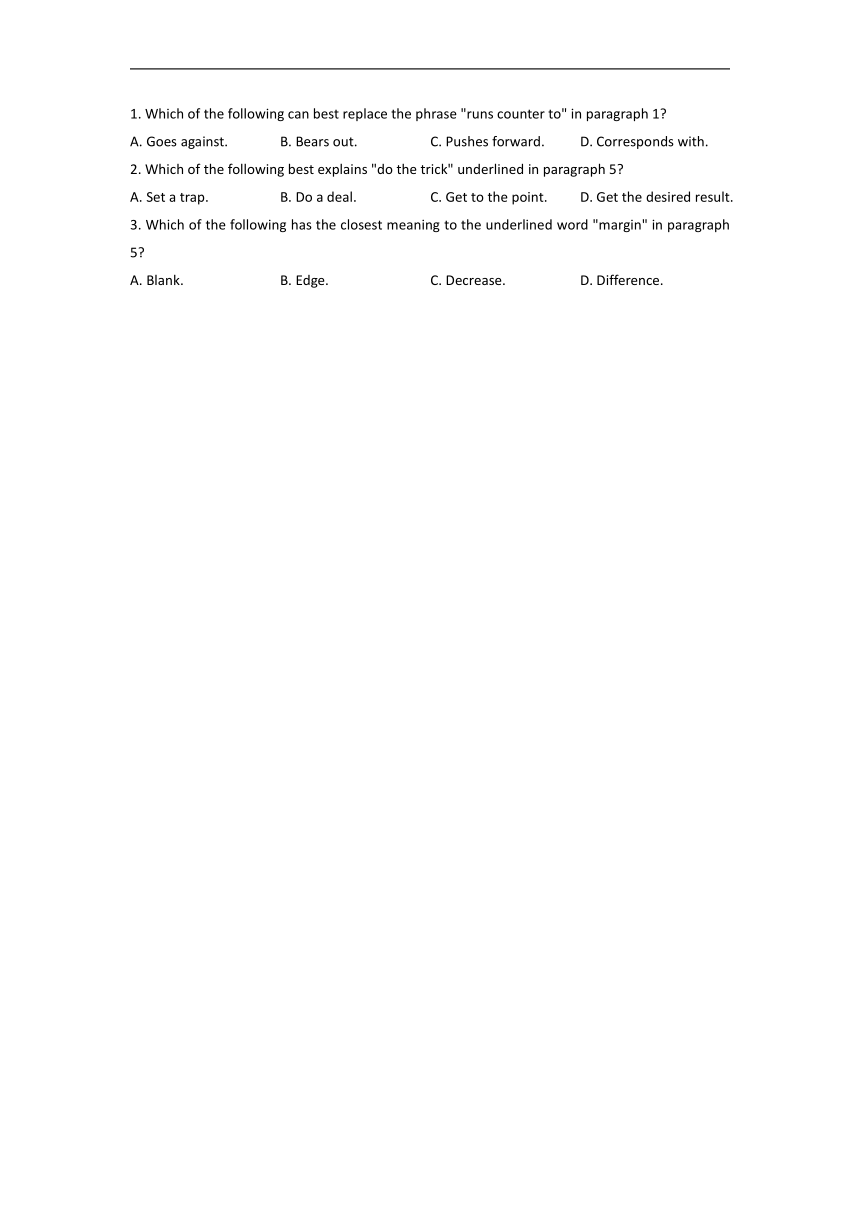北师大版(2019)选择性必修 第三册 Lesson 3 Epidemics Explained 随堂检测(含答案)
文档属性
| 名称 | 北师大版(2019)选择性必修 第三册 Lesson 3 Epidemics Explained 随堂检测(含答案) |

|
|
| 格式 | doc | ||
| 文件大小 | 20.2KB | ||
| 资源类型 | 教案 | ||
| 版本资源 | 北师大版(2019) | ||
| 科目 | 英语 | ||
| 更新时间 | 2022-03-27 00:00:00 | ||
图片预览



文档简介
Unit 9 Human Biology Lesson 3 Epidemics Explained——2021-2022学年高二英语北师大版(2019)选择性必修第三册随堂检测
一、填空
1.I don't like to define my work as a daily routine, which can be very d__________.
2.I watched them leave and then drove off in the o__________ direction.
3.The books in the school library are c__________ according to subject.
4.Restaurants can offer a choice of music along with the v__________ food choices on the menu...
5.Opinions on this matter vary _________ person to person.
6.I need to have a chance to get my head together and think __________(彻底) everything.
7.Take two coloured pens and __________(在……之下画线) the positive and negative words.
8.Sorry, Madam, I have __________(低估) you as I didn't know your background.
9.Anger is __________ (很少) looked upon as a beneficial character trait, and is usually advised to reduce it.
10.Of course, our brains can decline as we grow older for lots of reasons—including other environmental influences or genetic __________(因素).
二、七选五
Not long ago, no one understood that infectious diseases were caused by tiny organisms that moved from person to person. Even now, although we know that tiny living microbes cause disease, how they do so is not always obvious. ①_________ They can also be transmitted through our skin through insect or animal bites. The best way to prevent infections is to block pathogens(病原体) from entering the body.
The first line of defense is to keep germs at bay by following good personal health habits. Wash your hands well. You probably wash your hands after using the bathroom, before preparing or eating food, and after gardening or other dirty tasks. ②_________ Wet your hands thoroughly. Lather(起泡沫) up with soap or cleanser, and rub it into the palms and backs of your hands and your wrists. Be sure to clean your fingertips, under your nails and between your fingers. Wash under running water. ③_________
Whether you are young or young at heart, getting vaccinated(接种疫苗) is an essential part of staying healthy. ④_________ such as a temporarily sore arm or low fever, they are generally safe and effective. Vaccinations are essential if you are to avoid getting sick. In general, children should receive the recommended childhood vaccinations. Adults should make sure their vaccinations are up to date. When travelling abroad, check with your health care provider about additional immunisations (免疫).
⑤_________ Stay clear of wild animals. Many wild animals, including bats, foxes and coyotes, can spread the virus to humans by biting. Keep your pets away from wild animals, too. Dogs, cats or any other type of warm-blooded animals can pick up the virus and pass the virus along to people.
A. Dry your hands and wrists thoroughly.
B. Use animal control to prevent infections.
C. While vaccines may cause some common side effects,
D. Although vaccines cannot prevent some rare diseases,
E. Other wild animals cannot transmit the virus and other infections.
F. We do know that most microbes enter through openings in the body.
G. You should also wash up after blowing your nose, coughing, or sneezing.
三、阅读理解
We've known that sitting for long periods of time every day has countless health consequences, like a higher risk of heart disease. But now a new study has found that sitting is also bad for your brain, which runs counter to received ideas about deep thought, from our teachers, who told us to sit down and focus, to Rodin's famous "Thinker", seated with chin on hand.
A study published last week, conducted by Dr. Prabha Siddarth at the University of California, showed that sedentary(久坐的) behaviour is associated with reduced thickness of the medial temporal lobe (中颞叶), a brain area that is critical to learning and memory.
The researchers asked a group of 35 healthy people, aged 45 to 70, about their activity levels and the average number of hours each day spent sitting and then scanned their brains. They found that the subjects who reported sitting for longer periods had the thinnest medial temporal lobes. It means that the more time you spend in a chair the worse it is for your brain health, resulting in possible damage to learning and memory.
What is also interesting is that this study did not find a significant association between the level of physical activity and thickness of this brain area, suggesting that exercise, even severe exercise, may not be enough to protect you from the harmful effects of sitting.
It then surprisingly turned out that you don’t even have to move much to enhance cognition(认知) ;just standing will do the trick. For example, two groups of subjects were asked to complete a test while either sitting or standing. Participants are presented with conflicting stimuli(刺激), like the word "green" in blue ink, and asked to name the colour. Subjects thinking on their feet beat those who sat by a 3-millisecond margin.
The cognitive effects of severe physical exercise are well known. But the possibility that standing more and sitting less improves brain health could lower the bar for everyone.
1. Which of the following can best replace the phrase "runs counter to" in paragraph 1
A. Goes against. B. Bears out. C. Pushes forward. D. Corresponds with.
2. Which of the following best explains "do the trick" underlined in paragraph 5
A. Set a trap. B. Do a deal. C. Get to the point. D. Get the desired result.
3. Which of the following has the closest meaning to the underlined word "margin" in paragraph 5
A. Blank. B. Edge. C. Decrease. D. Difference.
答案以及解析
一、填空
1.答案:depressing
2.答案:opposite
3.答案:classified
4.答案:various
5.答案:from
6.答案:through
7.答案:underline
8.答案:underestimated
9.答案:rarely
10.答案:factors
二、七选五
答案:FGACB
解析:①考查上下文语境。结合后文"The best way to prevent infections is to block pathogens(病原体) from entering the body."可知,防止感染的最好方法是阻止病原体进入人体。因为大多数微生物通过身体进入体内,导致人感染。故选F项。
②考查上下文语境。前文的"Wash your hands well. You probably wash your hands after using the bathroom, before preparing or eating food, and after gardening or other dirty tasks."介绍了人们在什么情况下会及时洗手。G项"You should also wash up after blowing your nose, coughing, or sneezing."提到了另外几种需要洗手的情况,与前文需要洗手的情境为并列关系。故选G项。
③ 考查上下文语境。前文提到洗手的方法和步骤,洗手后需要擦手。A项"Dry your hands and wrists thoroughly."表示彻底擦干手和手腕,符合语境。
④ 考查主下文语境。结合后文"...such as a temporarily sore arm or low fever, they are generally safe and effective."可知,接种疫苗后会有手臂酸痛或低烧等症状。C项"While vaccines may cause some common side effects,"表示疫苗可能会引起一些常见的副作用,符合语境。
⑤考查段落主题句。结合后文"Many wild animals, including bats, foxes and coyotes, can spread the virus to humans by biting."可知,许多野生动物,包括蝙蝠、狐狸和郊狼,可以通过咬人将病毒传播给人类。故可推知动物会传播疾病,防止感染需要管控动物。B项"Use animal control to prevent infections."表示使用管控动物的方法来防止感染,符合语境。
三、阅读理解
答案:1-3 ADD
解析:1.词义猜测题。本题问及下列哪一项是替代第一段划线短语“runs counter to”的最佳选项。划线短语前面"But now a new study has found that sitting is also bad for your brain"提至一项新的研究发现坐着对大脑有害,而后半句"received ideas about deep thought, from our teachers, who told us to sit down and focus, to Rodin's famous 'Thinker', seated with chin on hand"则介绍了公认的关于深思的观念是坐着并集中注意力。由此可知, “坐着对大脑有害”与公认的观念相反,由此可推测划线短语"runs counter to"意为“与相反,与背道而驰”。go against“与相背”;bear out “证实”;push forward “推进”;correspond with “与一致”。故选A。
2.词义猜测题。本题问及下列哪一项能最好地解释第五段中的划线短语"do the trick"。根据划线处下文的"For example"可知,其后内容是对划线部分所在句的具体举例说明。 划线部分所在句句意为:结果令人惊奇的是,你甚至不需要为增强认知做太多动作,只要站着就可以_____。而下文所举的例子则证实站着思考的受试者比坐着的受试者反应更快、思维更敏捷。也就是说,“站着”这一行为成功达到了“增强认知”的目的。由此可推断出," do the trick "有“起作用,达到目的”之意。 此外,划线词前面的"don't even have to"和"just"也从语气上进行了暗示。set a trap“设陷讲”;do a deal“达成交易”;get to the point “谈到正题”;get the desired result“达到期望的目的”。D项与do the trick意思相近。故选D。
3.词义猜测题。本题问及下列哪一项与第五段中的划线词"margin"意思最接近。根据划线词所在句"Subjects thinking on their feet beat those who sat by a 3-millisecond margin."可知,站着思考的受试者击败了坐着的受试者。根据语境可知, "by a 3-millisecond margin"是指获胜者快了 3毫秒,即以3毫秒的差额取胜,所以"margin"在此处为“差额”之意。blank“空白处,空格”;edge “边缘”;decrease “减少”;difference “差别;差额”。 D项与margin意思最接近。故选D。
一、填空
1.I don't like to define my work as a daily routine, which can be very d__________.
2.I watched them leave and then drove off in the o__________ direction.
3.The books in the school library are c__________ according to subject.
4.Restaurants can offer a choice of music along with the v__________ food choices on the menu...
5.Opinions on this matter vary _________ person to person.
6.I need to have a chance to get my head together and think __________(彻底) everything.
7.Take two coloured pens and __________(在……之下画线) the positive and negative words.
8.Sorry, Madam, I have __________(低估) you as I didn't know your background.
9.Anger is __________ (很少) looked upon as a beneficial character trait, and is usually advised to reduce it.
10.Of course, our brains can decline as we grow older for lots of reasons—including other environmental influences or genetic __________(因素).
二、七选五
Not long ago, no one understood that infectious diseases were caused by tiny organisms that moved from person to person. Even now, although we know that tiny living microbes cause disease, how they do so is not always obvious. ①_________ They can also be transmitted through our skin through insect or animal bites. The best way to prevent infections is to block pathogens(病原体) from entering the body.
The first line of defense is to keep germs at bay by following good personal health habits. Wash your hands well. You probably wash your hands after using the bathroom, before preparing or eating food, and after gardening or other dirty tasks. ②_________ Wet your hands thoroughly. Lather(起泡沫) up with soap or cleanser, and rub it into the palms and backs of your hands and your wrists. Be sure to clean your fingertips, under your nails and between your fingers. Wash under running water. ③_________
Whether you are young or young at heart, getting vaccinated(接种疫苗) is an essential part of staying healthy. ④_________ such as a temporarily sore arm or low fever, they are generally safe and effective. Vaccinations are essential if you are to avoid getting sick. In general, children should receive the recommended childhood vaccinations. Adults should make sure their vaccinations are up to date. When travelling abroad, check with your health care provider about additional immunisations (免疫).
⑤_________ Stay clear of wild animals. Many wild animals, including bats, foxes and coyotes, can spread the virus to humans by biting. Keep your pets away from wild animals, too. Dogs, cats or any other type of warm-blooded animals can pick up the virus and pass the virus along to people.
A. Dry your hands and wrists thoroughly.
B. Use animal control to prevent infections.
C. While vaccines may cause some common side effects,
D. Although vaccines cannot prevent some rare diseases,
E. Other wild animals cannot transmit the virus and other infections.
F. We do know that most microbes enter through openings in the body.
G. You should also wash up after blowing your nose, coughing, or sneezing.
三、阅读理解
We've known that sitting for long periods of time every day has countless health consequences, like a higher risk of heart disease. But now a new study has found that sitting is also bad for your brain, which runs counter to received ideas about deep thought, from our teachers, who told us to sit down and focus, to Rodin's famous "Thinker", seated with chin on hand.
A study published last week, conducted by Dr. Prabha Siddarth at the University of California, showed that sedentary(久坐的) behaviour is associated with reduced thickness of the medial temporal lobe (中颞叶), a brain area that is critical to learning and memory.
The researchers asked a group of 35 healthy people, aged 45 to 70, about their activity levels and the average number of hours each day spent sitting and then scanned their brains. They found that the subjects who reported sitting for longer periods had the thinnest medial temporal lobes. It means that the more time you spend in a chair the worse it is for your brain health, resulting in possible damage to learning and memory.
What is also interesting is that this study did not find a significant association between the level of physical activity and thickness of this brain area, suggesting that exercise, even severe exercise, may not be enough to protect you from the harmful effects of sitting.
It then surprisingly turned out that you don’t even have to move much to enhance cognition(认知) ;just standing will do the trick. For example, two groups of subjects were asked to complete a test while either sitting or standing. Participants are presented with conflicting stimuli(刺激), like the word "green" in blue ink, and asked to name the colour. Subjects thinking on their feet beat those who sat by a 3-millisecond margin.
The cognitive effects of severe physical exercise are well known. But the possibility that standing more and sitting less improves brain health could lower the bar for everyone.
1. Which of the following can best replace the phrase "runs counter to" in paragraph 1
A. Goes against. B. Bears out. C. Pushes forward. D. Corresponds with.
2. Which of the following best explains "do the trick" underlined in paragraph 5
A. Set a trap. B. Do a deal. C. Get to the point. D. Get the desired result.
3. Which of the following has the closest meaning to the underlined word "margin" in paragraph 5
A. Blank. B. Edge. C. Decrease. D. Difference.
答案以及解析
一、填空
1.答案:depressing
2.答案:opposite
3.答案:classified
4.答案:various
5.答案:from
6.答案:through
7.答案:underline
8.答案:underestimated
9.答案:rarely
10.答案:factors
二、七选五
答案:FGACB
解析:①考查上下文语境。结合后文"The best way to prevent infections is to block pathogens(病原体) from entering the body."可知,防止感染的最好方法是阻止病原体进入人体。因为大多数微生物通过身体进入体内,导致人感染。故选F项。
②考查上下文语境。前文的"Wash your hands well. You probably wash your hands after using the bathroom, before preparing or eating food, and after gardening or other dirty tasks."介绍了人们在什么情况下会及时洗手。G项"You should also wash up after blowing your nose, coughing, or sneezing."提到了另外几种需要洗手的情况,与前文需要洗手的情境为并列关系。故选G项。
③ 考查上下文语境。前文提到洗手的方法和步骤,洗手后需要擦手。A项"Dry your hands and wrists thoroughly."表示彻底擦干手和手腕,符合语境。
④ 考查主下文语境。结合后文"...such as a temporarily sore arm or low fever, they are generally safe and effective."可知,接种疫苗后会有手臂酸痛或低烧等症状。C项"While vaccines may cause some common side effects,"表示疫苗可能会引起一些常见的副作用,符合语境。
⑤考查段落主题句。结合后文"Many wild animals, including bats, foxes and coyotes, can spread the virus to humans by biting."可知,许多野生动物,包括蝙蝠、狐狸和郊狼,可以通过咬人将病毒传播给人类。故可推知动物会传播疾病,防止感染需要管控动物。B项"Use animal control to prevent infections."表示使用管控动物的方法来防止感染,符合语境。
三、阅读理解
答案:1-3 ADD
解析:1.词义猜测题。本题问及下列哪一项是替代第一段划线短语“runs counter to”的最佳选项。划线短语前面"But now a new study has found that sitting is also bad for your brain"提至一项新的研究发现坐着对大脑有害,而后半句"received ideas about deep thought, from our teachers, who told us to sit down and focus, to Rodin's famous 'Thinker', seated with chin on hand"则介绍了公认的关于深思的观念是坐着并集中注意力。由此可知, “坐着对大脑有害”与公认的观念相反,由此可推测划线短语"runs counter to"意为“与相反,与背道而驰”。go against“与相背”;bear out “证实”;push forward “推进”;correspond with “与一致”。故选A。
2.词义猜测题。本题问及下列哪一项能最好地解释第五段中的划线短语"do the trick"。根据划线处下文的"For example"可知,其后内容是对划线部分所在句的具体举例说明。 划线部分所在句句意为:结果令人惊奇的是,你甚至不需要为增强认知做太多动作,只要站着就可以_____。而下文所举的例子则证实站着思考的受试者比坐着的受试者反应更快、思维更敏捷。也就是说,“站着”这一行为成功达到了“增强认知”的目的。由此可推断出," do the trick "有“起作用,达到目的”之意。 此外,划线词前面的"don't even have to"和"just"也从语气上进行了暗示。set a trap“设陷讲”;do a deal“达成交易”;get to the point “谈到正题”;get the desired result“达到期望的目的”。D项与do the trick意思相近。故选D。
3.词义猜测题。本题问及下列哪一项与第五段中的划线词"margin"意思最接近。根据划线词所在句"Subjects thinking on their feet beat those who sat by a 3-millisecond margin."可知,站着思考的受试者击败了坐着的受试者。根据语境可知, "by a 3-millisecond margin"是指获胜者快了 3毫秒,即以3毫秒的差额取胜,所以"margin"在此处为“差额”之意。blank“空白处,空格”;edge “边缘”;decrease “减少”;difference “差别;差额”。 D项与margin意思最接近。故选D。
